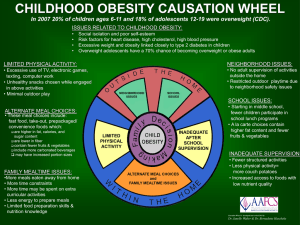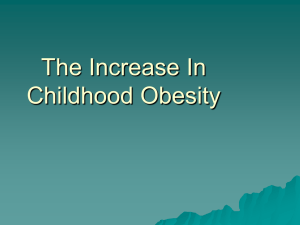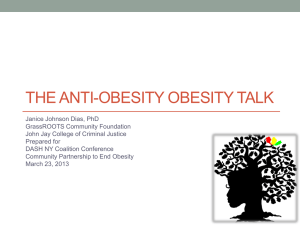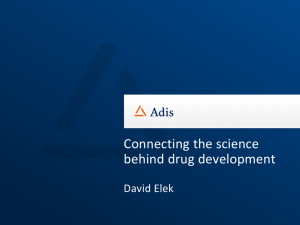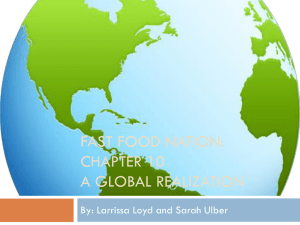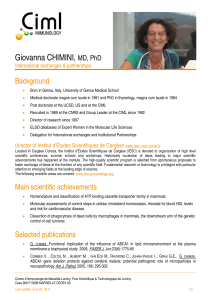Free-Market Solutions for Overweight Americans
advertisement
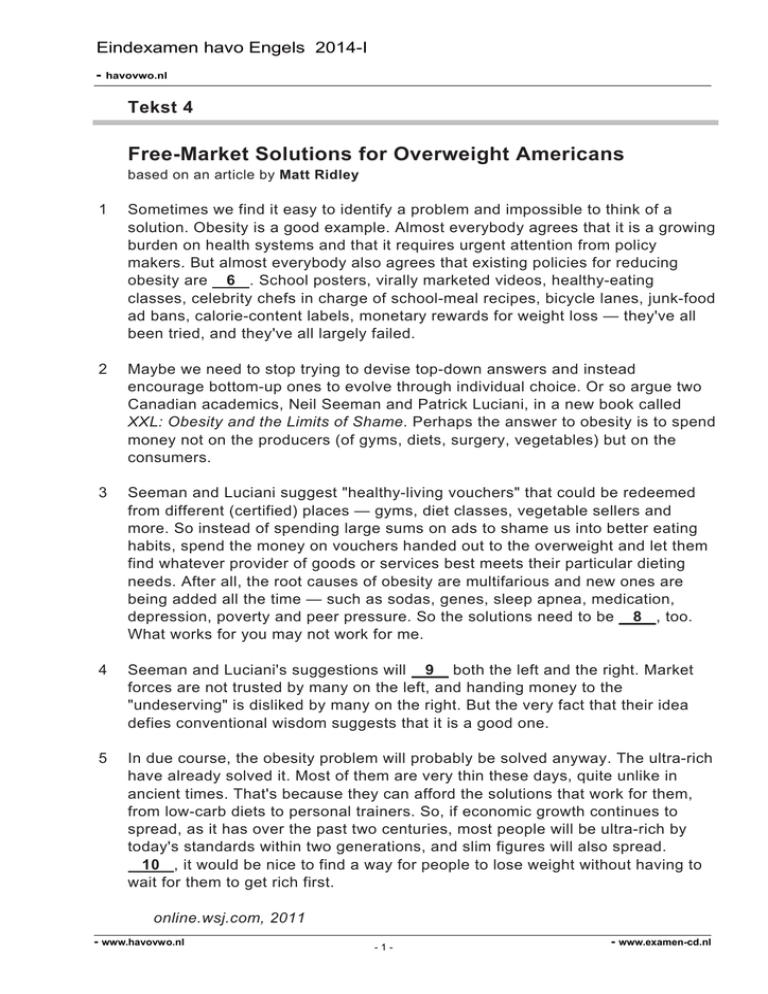
Eindexamen havo Engels 2014-I - havovwo.nl Tekst 4 Free-Market Solutions for Overweight Americans based on an article by Matt Ridley 1 Sometimes we find it easy to identify a problem and impossible to think of a solution. Obesity is a good example. Almost everybody agrees that it is a growing burden on health systems and that it requires urgent attention from policy makers. But almost everybody also agrees that existing policies for reducing obesity are 6 . School posters, virally marketed videos, healthy-eating classes, celebrity chefs in charge of school-meal recipes, bicycle lanes, junk-food ad bans, calorie-content labels, monetary rewards for weight loss — they've all been tried, and they've all largely failed. 2 Maybe we need to stop trying to devise top-down answers and instead encourage bottom-up ones to evolve through individual choice. Or so argue two Canadian academics, Neil Seeman and Patrick Luciani, in a new book called XXL: Obesity and the Limits of Shame. Perhaps the answer to obesity is to spend money not on the producers (of gyms, diets, surgery, vegetables) but on the consumers. 3 Seeman and Luciani suggest "healthy-living vouchers" that could be redeemed from different (certified) places — gyms, diet classes, vegetable sellers and more. So instead of spending large sums on ads to shame us into better eating habits, spend the money on vouchers handed out to the overweight and let them find whatever provider of goods or services best meets their particular dieting needs. After all, the root causes of obesity are multifarious and new ones are being added all the time — such as sodas, genes, sleep apnea, medication, depression, poverty and peer pressure. So the solutions need to be 8 , too. What works for you may not work for me. 4 Seeman and Luciani's suggestions will 9 both the left and the right. Market forces are not trusted by many on the left, and handing money to the "undeserving" is disliked by many on the right. But the very fact that their idea defies conventional wisdom suggests that it is a good one. 5 In due course, the obesity problem will probably be solved anyway. The ultra-rich have already solved it. Most of them are very thin these days, quite unlike in ancient times. That's because they can afford the solutions that work for them, from low-carb diets to personal trainers. So, if economic growth continues to spread, as it has over the past two centuries, most people will be ultra-rich by today's standards within two generations, and slim figures will also spread. 10 , it would be nice to find a way for people to lose weight without having to wait for them to get rich first. online.wsj.com, 2011 - www.havovwo.nl -1- - www.examen-cd.nl Eindexamen havo Engels 2014-I - havovwo.nl Tekst 4 Free-market solutions for overweight Americans 1p 6 1p 7 1p 8 Which of the following fits the gap in paragraph 1? A ineffective B rather pushy C too costly D unpopular “the consumers” (einde alinea 2) Naar wie verwijst “consumers”? A “policy makers” (alinea 1) B “celebrity chefs” (alinea 1) C “academics” (alinea 2) D “the overweight” (alinea 3) E “The ultra-rich” (alinea 5) Which of the following fits the gap in paragraph 3? diverse ethical inexpensive medical scientific social A B C D E F 1p 9 1p 10 Which of the following fits the gap in paragraph 4? A annoy B benefit C disqualify D include Which of the following fits the gap in paragraph 5? Moreover Nevertheless Similarly Therefore A B C D 1p 11 Geeft de schrijver van dit artikel aan hoe hij denkt over het voorstel van Neil Seeman en Patrick Luciani? Zo nee, antwoord “Nee”. Zo ja, citeer de eerste twee woorden van de zin waarin zijn mening te vinden is. - www.havovwo.nl -2- - www.examen-cd.nl
